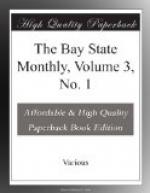“We whose names are underwritten, do acknowledge that it was our weakness that we were so inconsiderate as to make a small seat in the meeting-house without more clear and full approbation of the town and selectmen thereof, though we thought upon the conference we had with some of the selectmen apart, and elders, we had satisfying ground for our proceeding therein; w’ch we now see was not sufficent; therefore we do desire that our failing therein may be passed by; and if the town will grant our seat that we have been at so much cost in setting up, we thankfully acknowledge your love unto us therein, and we do hereupon further engage ourselves that we will not give up nor sell any of our places in that seat to any person or persons but whom the elders shall approve of, or such as shall have power to place men in seats in the assembly.
[Signed]. INCREASE ATHERTON,
SAMUEL PROCTOR,
THOMAS BIRD.
At another time one Joseph Leeds, a member of the church, was accused of maltreating his wife; the charge was sustained, and after the case had been considered at several special meetings, it was settled by his confessing and promising “to carry it more lovingly to her for time to come.” But Jonathan Blackman, another erring brother, was charged with misdemeanors that could not be so easily overlooked; he was accused of lying and also of stealing. He had been whipped for these offences, but refused to come before the church for wholesome discipline, and ran away out of the jurisdiction. Accordingly he was “disowned from his church relation and excommunicated, though not deliuered up to Satan, as those in full communion, but yet to be looked at as a Heathen and a Publican unto his relations natural and civil, that he might be ashamed.”
Another class of statutes—laws that have a queer sound in nineteenth-century Massachusetts—were designed for the encouragement of special public service. Here are examples of some of them:
“1638. For the better encouragement of any that shall destroy wolves, it is ordered that for every wolf any man shall take in Dorchester plantation, he shall have 20’s by the town, for the first wolf, 15’s for the second, and for every wolf afterwards, 10’s besides the Country’s pay.”
“1736. Voted, that whosoever shall kill brown rats, so much grown as to have their hair on them, within y’e town of Dochester, y’e year ensuing, until our meeting in May next, and bring in their scalps with y’e ears on unto y’e town treasurer, shall be paid by y’e town treasurer Fourpence for every rat’s scalp.”
The same year the town offered a bounty for the destroying of striped squirrels.
Now that the recent death of Wendell Phillips brings freshly to mind the bitter opposition with which the early champions of abolution were treated in Boston and vicinity, it is pleasant to find in the musty records of the Dochester Plantation emphatic evidence that they not only recognized slavery as an evil, and the slave-trade as a heinous crime, but that they set their faces like a flint against it. The traffic in slaves began among the colonists in the winter of 1645-6, and in the following November the court placed on record this outspoken denunciation of the practice:




